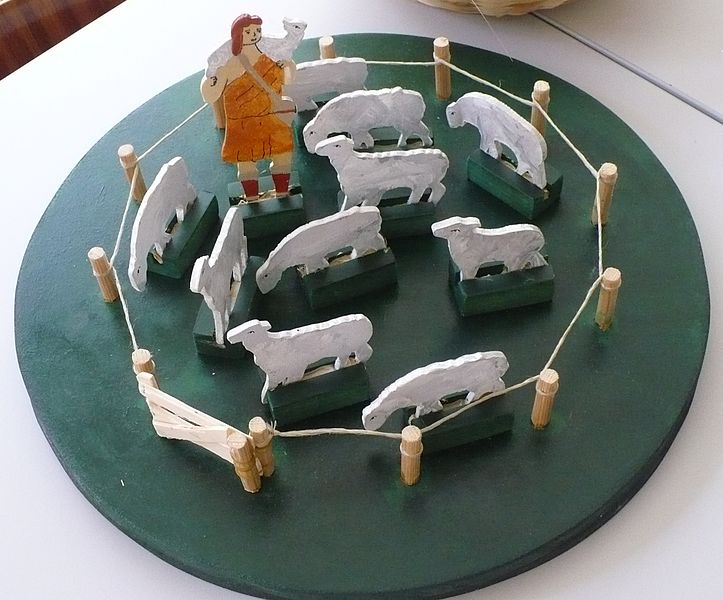A while back (a few weeks ago, so eons in Internet time) there was a big debate among Catholic Patheosi on how we should do catechesis. I wasn’t a Patheosi at the time so I just threw a few spitballs. But it seems to me that I (and we) skipped a step. Before we ask how we catechize kids, we should probably ask what for. “To make disciples for Christ!” Well, ok.
I’ve been in the frontlines of catechesis, in one form or another, most of my life. I taught catechism for many years in the school which I attended, and now I teach catechism in my parish. And of course before that I was in catechism as a good Catholic pupil. And before all the problems we could talk about–milquetoast materials, a syrupy tsunami of good intentions, non-methods…heresy…–I think one problem is a lack of priorities. Catholicism simply has so much stuff.
In particular, it seems to me that the way that many adults in the Church evaluate catechesis is by the criterion of knowledge. “In my day, people used to know the theological virtues! And could rattle off the seven sacraments! And the color of the vestments for each holy day!”
It should be obvious, I hope, that between a kid who doesn’t know the difference between the Assumption and the Ascension, but knows, in her heart, that Jesus Christ is Lord and died for her personally, and a kid who can rattle off all the high holy days just because he can rattle off a poem he’s learned, we should prefer the former. Of course, ideally, we would have faith and knowledge. But if we had to choose, we would pick the former. And the landscape of contemporary catechesis makes me think that we are very much in a “field hospital” and we should do triage. And I say this as someone who is reverently impressed at an octogenarian grandmother he’s met, who could still recite by heart the pre-Vatican II Catechism of the Bishops of France that she learned as a little girl.
With those prolegomena in mind, here are a handful of very simple priorities that I think we should keep as lodestars:
1. The kerygma. This may sound obvious but, believe you me, it is not. Jesus Christ is the Son of the Living God, who became man, and died on the Cross personally for you, and rose again on the third day, and through His Cross and Resurrection he destroyed death and sin and through Him we are free. This fact is literally the most important fact in all of the Universe, in all of existence. If you have gotten this fact through to the little ones, you have succeeded in your catechesis (note: it’s not “you” that gets it sink in, it’s the Holy Spirit). What is the point of spending months making a poster-sized timeline of the Old Testament if nobody has even heard this?
2. Salvation by grace. I wish I’d had a penny for every time I heard some well-meaning housewife explain that to be a Christian is to try hard to be a good person. No! To be a Christian is to surrender to the grace of Christ and be incorporated into His Body which is the Church, and to be changed by His grace. The everyday pseudo-Pelagianism of many Christians is a tumor to be extirpated. Yes, yes, it is a grace that we co-operate with, as co-workers in the vineyard of the Lord. But we are saved by grace, not by works. And it pains me to think that this is still something many haven’t realized. This is particularly important in the context of catechizing children, because the worst thing you can do is to teach a young kid that being a “good Christian” (a contradiction in terms) is coloring within the lines and obeying Mom and Dad (obeying Mom and Dad! Yes, I have heard this!), because as soon as they reach adolescence they will junk the “Christianity” they’ve been taught as so much conformism and control structure (and they would be right to junk this false Christianity). Salvation by grace is and remains the most subversive message of Christianity, and it is one that is not taught enough.
3. The sacraments. I think my co-blogger Fr. Dwight Longenecker is absolutely right that one of, if not the biggest problem, in the Church is that most Catholics, even most Mass-goers, have stopped believing in the Real Presence. How fundamental this is! The Real Presence is everything. It is the key that unlocks everything about Christianity. It shows us–makes present–the Living God who became incarnate out of love and generosity, not necessity, a humble God, a God who came to serve, not to be served, a God who rescues us through nature and through the world and through our own humanity. The Real Presence is the rescue party of God, it is our help, our medicine, it is what carries us, what lifts us up. If kids aren’t catechized in the Real Presence, we have failed. Little kids should go to Eucharistic adoration. We need to think really hard about paedocommunion. The other very important sacrament for catechism is confession! God smashes the chains of sin that we keep putting on ourselves. It is liberation. When I was a kid and I went to confession, I literally felt like I was walking on air afterwards. Confession is so, so powerful for children. Once we get you hooked on the Real Presence and confession, you can’t leave. Muahahaha!
I have a bias for numbering things in threes, so I’ll probably leave this as the list, but I would nonetheless mention a couple more points. The first is prayer. It seems increasingly inconceivable to me that coaching people in prayer is something that the institutional Church basically doesn’t do. Especially for kids, this is criminal. Prayer is something that we’re basically supposed to know how to do innately. Now, of course, in one sense it is true–the Holy Spirit can reach us anywhere, at any time. But we are co-workers in the vineyard of the Lord. Imaginative prayer. Discursive prayer. Contemplative prayer. Meditation. Lectio divina. Little children, who are so receptive to the numinous, should be accompanied and coached and helped to pray, and pray well. Through this, they may deepen their relationship with Jesus Christ in a way that never leaves them. (This is a big hobbyhorse of mine–we need to do this for adults too. Stay tuned.)
The second is a “method” thing rather than a “goals” thing but I think it’s so important that it needs to be mentioned whenever the opportunity arises: it’s never too early! The truth of Christianity totally can be grasped by little children. Very little children. Three year olds. Four year olds. And they have such a link to the numinous! The faith of a child is a wonderful, important thing, which must be nurtured and strengthened so that it can be the seed of adult faith. This is especially important nowadays that–I see it, catechizing 9-10 year olds–the traits of adolescence come earlier and earlier, with its self-aggrandizing hermeticism, and its rebellion for the sake of rebellion. It’s never too early! A three-year-old can understand the Incarnation, insofar as it can be understood; in fact, probably better than you or me.
I’m sure I’ve missed something, and I’m sure I’m going about this the wrong way. But I have a feeling that if we were all on the same page, at least on this, we would have taken a very big step forward.













